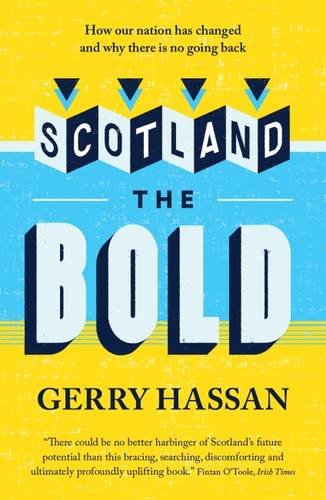 Buy the book here. See review by Alastair McIntosh.
Buy the book here. See review by Alastair McIntosh.
Scotland the Bold explores how Scotland became what it is, considers what choices and obstacles it faces, identifies signs of people taking power into their own hands and addresses what we can all do to create a radically different, democratic and better Scotland. Scotland is now visibly different from the rest of the UK and the self-evidently bankrupt economic, social and political thinking that dominate British elites. Majority Scottish opinion is repulsed by a million people relying on food-banks and the prevalence of welfare sanctions in the fifth richest economy in the world. For self-government to have any meaning it entails addressing some hard and difficult truths about ourselves, and begin to talk honestly and maturely about Scotland’s future and some of the difficult choices we will have to make; reflecting on where we have come from, what we are proud of, our mistakes, and how we do things better in the future. The book covers:
- Scotland’s place in today’s world: where are we now? Post-indyref, post-Brexit, on the cusp of Trump – we’re in a world of uncertainty. We are “a Scotland that doesn’t give blank cheques or blind obedience to any political tradition or authority” – and don’t believe in easy answers or simple clarion calls.
- Scotland after the short (IndyRef) and the long (Velvet) revolutions – the crisis of confidence in unionism and institutions (RBS, the banks, the BBC, the Labour party) – but true liberation requires us to imagine and dare to reach a Scotland beyond “Them and Us”.
- What’s changed and what’s not changed? The Thatcher years, the decline in trade unionism, the decline of council housing, the loss of “local” from local government, the shift from Labour to the SNP, the reasons for the decline of the Labour Party – and the conservatism of large swathes of public life.
- 21st century nation: Scotland’s changing state – an appraisal of 17 years of devolution.
- What has gone wrong with Britain? The UK is in crisis: falling living standards, investment, productivity, National debt and deficit, culture of corporate capitalism, the rise of the Serco state, the democratic deficit. Since the onset of the First World War in 1914, there is not a single year in which the UK armed forces have not been active in combat. The UK is an Empire State –devised for global pretensions, projection and military expeditions, not designed for the care or wellbeing of its own people
- The limits of Scotland’s revolution – we need leadership for a future very different from the past.
- Home truths about Home Rule Scotland – is our social democratic consensus as strong as we think (we still have poverty, deprivation and educational inequality)? Our elites exist (71% of privately educated school entrants admitted to 1 of the 4 ancient universities, compared to 29% for state school entrants).
- Scotland as a Mongrel Nation: we should take pride in our mongrel contrarian culture, Scots internationalism, our sense or lack of sense of culture, and totemic matters such as Trident.
- Free your mind – the independence of the Scottish mind is real and revolutionary.
- What can we do about Britain– should we look for a new set of arrangements between the UK nations?
- The 4 dimensions of Scotland international – Scottish, UK, European and global
- A Republic of the mind. Scotland’s future needs 7 good stories – economic, social justice, cultural, democratic, philosophical, psychological and geo-political.
- Manifesto for an alternative Scotland: 64 possible actions for a bold Scotland, such as a written constitution, a Bill of Rights, a Citizens’ Chamber, a Central Bank of Scotland, a National Investment Bank, investment in SMEs (Small and Medium enterprises), encouraging young people to be more entrepreneurial, a publicly-owned Scottish Energy, support for Community Energy schemes, a Scottish Broadcasting Corporation, a Scottish Film Agency, more land reform, a land value tax, citizen’s basic income, empowering local democracy, following the Finnish example of schooling, incorporation of elite private schools into the public sector, free universal childcare from 0 to 14, review of the Scottish legal system, calling time on Trident, and so on.
Yes Edinburgh West has a website, Facebook, Twitter, National Yes Registry and a Library of topics on Scottish Politics, including Independence.



